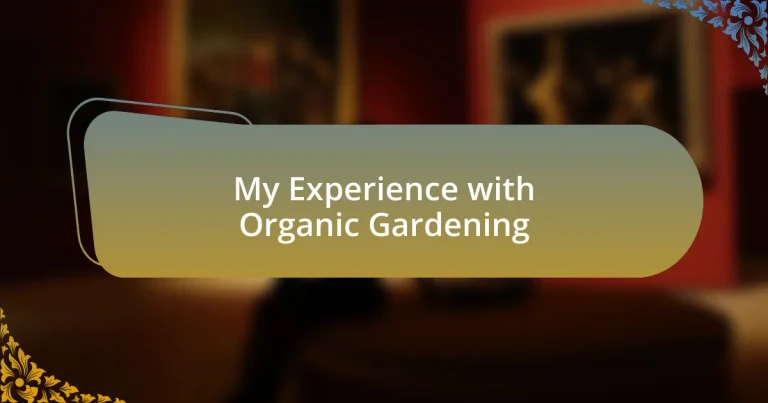Key takeaways:
- Organic gardening involves natural cultivation methods, emphasizing sustainability and health without synthetic chemicals.
- Benefits include improved flavor of produce, environmental health, and therapeutic effects on the gardener.
- Key challenges faced include pest management, weather unpredictability, and the commitment required for maintenance.
- Essential tips for success highlight the importance of soil health, crop rotation, and cultivating patience in the gardening process.
Author: Clara Kensington
Bio: Clara Kensington is an award-winning author known for her poignant storytelling and rich character development. With a background in psychology, she weaves intricate narratives that explore the complexities of human emotions and relationships. Her debut novel, “Whispers of the Past,” received critical acclaim and was featured on several bestseller lists. Clara holds an MFA in Creative Writing from the University of Southern California and has contributed essays and short stories to various literary magazines. When she’s not writing, Clara enjoys hiking in the mountains and volunteering at local literacy programs. She currently resides in Portland, Oregon, with her two rescue dogs.
What is Organic Gardening
Organic gardening is a method of cultivating plants without synthetic fertilizers or pesticides, focusing instead on natural substances and processes. I remember my first time planting tomatoes; I was amazed to see how the earth itself could nurture these vibrant fruits just by using compost and a few well-placed herbs for pest control. Isn’t it fascinating how nature often has the best solutions?
When I think of organic gardening, I see it as a holistic approach that respects the ecosystem. For example, I’ve found that planting marigolds alongside my vegetables not only beautifies my garden but also attracts beneficial insects. It really makes me ponder: how can we learn from the balance found in nature and apply it to our lives?
The beauty of organic gardening lies in its commitment to sustainability and health. Each time I harvest my crops, I feel a profound connection to the earth, knowing I played a part in a chemical-free cycle of growth. How rewarding it is to know that what I’m feeding myself and my family is not only nourishing but also grown in harmony with the environment!
Benefits of Organic Gardening
Organic gardening offers numerous benefits that extend beyond just growing food. For instance, I’ve noticed that the variety of flavors from organically grown produce is unparalleled. When I bit into a carrot from my garden, the sweetness was a delightful surprise, reminding me that the way we grow food directly influences its taste. Have you ever experienced this difference yourself?
Beyond flavor, organic gardening contributes to a healthier environment. By avoiding synthetic chemicals, I find peace of mind knowing that I’m not contributing to soil and water pollution. It’s heartening to think that my gardening practices can help support biodiversity in my local ecosystem—what a powerful way to connect with nature!
Moreover, cultivating my own organic garden serves as a therapeutic escape from daily stress. There’s something soothing about getting my hands in the soil, and watching my plants thrive brings me immense joy. Can’t you just picture that moment when you see your first bloom? It’s truly a reminder that patience and care yield beautiful rewards.
Essential Tools for Organic Gardening
Having the right tools can make all the difference in organic gardening. I’ve personally found that a good-quality spade is essential for turning the soil and breaking up compacted earth. I remember when I first started, my spade felt like an extension of my hand; it turned tedious tasks into manageable ones. What tools do you find indispensable in your gardening experience?
Another vital tool is a sturdy pair of gardening gloves. Early on, I neglected to use them, and my hands paid the price with scratches and dirt under my nails. Now, with a comfortable set of gloves, I can dig, prune, and weed without worry. Isn’t it amazing how a simple tool can enhance our enjoyment of the task at hand?
Don’t overlook the importance of a hose or watering can, either. I recall a day when I was hand-watering my seedlings with a small can, and it felt incredibly rewarding to provide them with nourishment directly. However, as my garden grew, I learned that having a hose with a spray attachment saved me time and energy, allowing me to focus more on enjoying the process rather than working against it. How do you prefer to hydrate your plants?
Steps to Start Organic Gardening
Starting an organic garden begins with choosing the right location for your plants. I’ve discovered that a sunny spot with good drainage can significantly impact plant growth. When I first planted my tomatoes in a shaded area, they struggled to thrive, which taught me the importance of sun exposure. Have you thought about how sunlight affects your gardening choices?
Next, it’s crucial to prepare your soil. I remember the joy of mixing compost into my garden bed for the first time. Seeing the rich, dark earth come to life made me feel like I was doing something genuinely beneficial for the environment. Engaging in this process not only enriches the soil but also cultivates a sense of connection with nature that I find deeply fulfilling.
Once your soil is ready, selecting the right seeds or plants is the next step. I often find myself overwhelmed by the variety available, but I focus on plants that I know I’ll use in my kitchen. Choosing basil for my summer salads transformed my meals, and each harvest reminds me of the hard work behind it. What plants do you envision bringing from your garden to your table?
My Journey into Organic Gardening
As I embarked on my journey into organic gardening, the initial thrill of planting felt almost childlike. I vividly recall the moment of digging into the rich earth and feeling its cool texture beneath my fingers. It was a sensory experience that grounded me and made everything else fade away. Have you ever felt that kind of contentment when connecting with the soil?
The first time I watched my seedlings sprout, it was a moment of sheer excitement. Those tiny green shoots reaching for the sky filled me with hope and a sense of accomplishment. I remember dancing around the garden, celebrating this new life I had nurtured. It made me realize that every small effort in the garden contributes to a greater purpose. Have you ever experienced the thrill of nurturing something from seed to harvest?
Over time, I’ve learned that organic gardening is about more than just growing food; it’s about fostering a relationship with nature. Each task, whether weeding or composting, feels like a conversation with the earth itself. I sometimes find myself talking to my plants, sharing my day or my worries, and in return, they provide a sense of peace. How does nature inspire you in your daily life?
Challenges of Organic Gardening
One of the most significant challenges I faced in organic gardening was the constant battle against pests. I remember one season when my tomato plants were absolutely decimated by aphids. Seeing my hard work threatened so suddenly made my heart sink. I had to remind myself that this was part of the process, and I learned to look for natural solutions instead of resorting to pesticides. Have you ever felt helpless when your plans go off course?
Weather conditions also play a crucial role in the success of my garden. There was a particular summer when an unexpected drought hit, leaving my carefully nurtured plants thirsting for moisture. I felt a palpable sense of anxiety as I watched the once-lush greenery begin to wilt. This experience taught me the importance of rainwater collection and being prepared for the unpredictability of Mother Nature. Have you ever been at the mercy of the elements?
Lastly, the time and commitment required for organic gardening can be overwhelming. Balancing my work, family, and gardening responsibilities sometimes felt like juggling too many balls at once. I recall nights spent researching companion planting and organic fertilizers when all I really wanted was a moment to relax. However, I realized that the rewards were worth the effort, as each challenge helped me grow alongside my plants. Have you ever found that the hard work pays off in unexpected ways?
Tips for Successful Organic Gardening
When it comes to cultivating an organic garden, understanding soil health has been a game-changer for me. I remember when I first started, my soil was quite compacted, and my plants struggled to grow. It wasn’t until I began enriching it with compost and natural fertilizers that I truly saw a transformation. Have you ever felt the difference that healthy soil can make in your gardening journey?
Another essential tip I’ve discovered is the importance of crop rotation. In my early days, I planted the same vegetables in the same spots year after year, only to witness diminishing yields. Now, each season, I carefully plan which crops go where, helping to prevent pest buildup and nutrient depletion. Have you noticed how changing things up can bring new life to your garden?
Lastly, I’ve learned that patience is one of the most underestimated virtues in organic gardening. There were days when I anxiously checked on my seedlings, wondering why they weren’t growing as fast as I hoped. Over time, I’ve realized that nature has its own timeline, and sometimes, a little patience rewards you with a more resilient, thriving garden. Have you experienced the satisfaction of watching your hard work finally pay off in due course?


